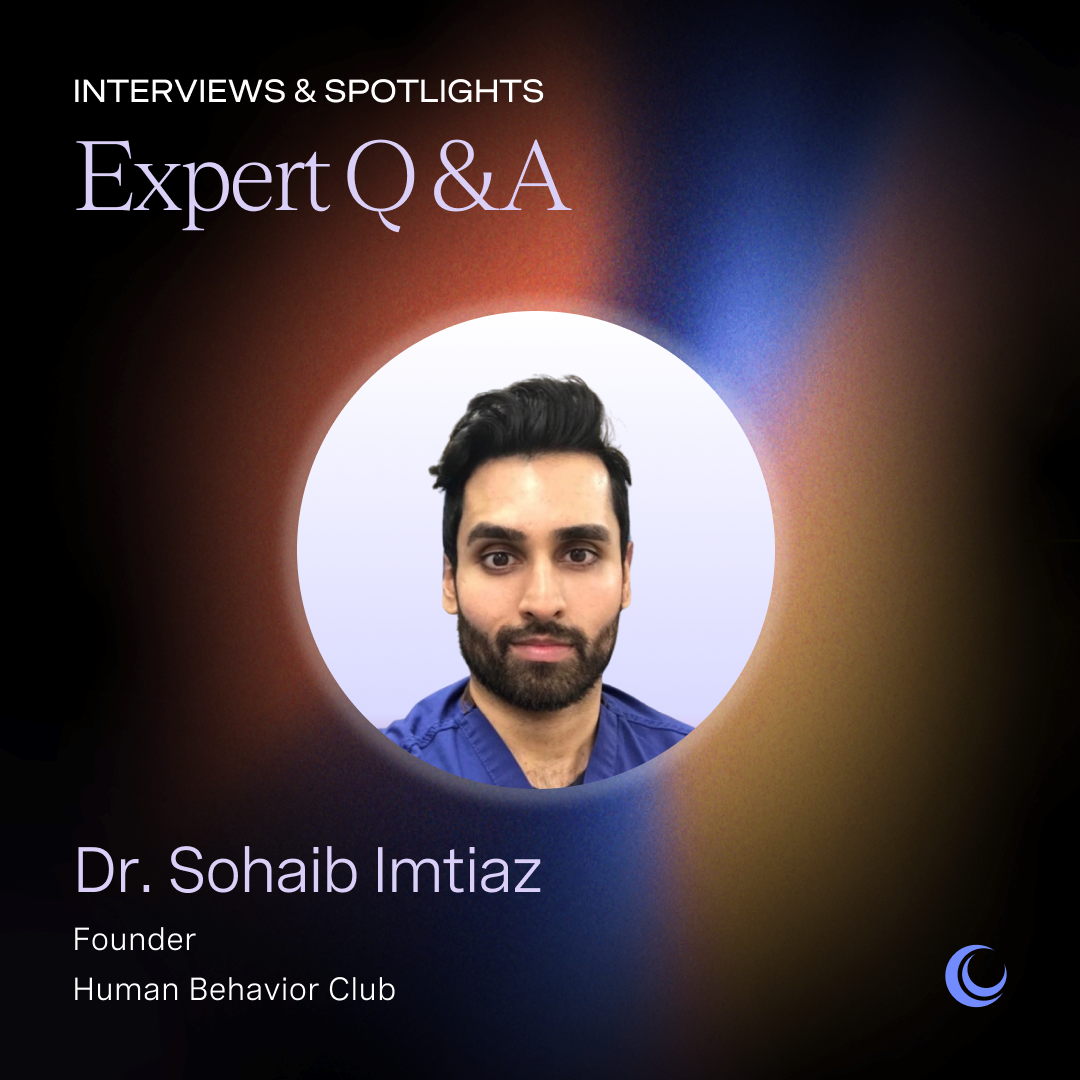Doctor's Orders: Behavior Science Founder Dr. Sohaib Imtiaz on How to Improve Your Sleep Health
As the founder of the Human Behaviour Club (the largest on Clubhouse), Dr. Sohaib dissects how we interact with tech and health based on behavioral economics and cognitive science.

Blending lifestyle medicine, tech, and the fundamental underpinnings of human behavior science, Dr. Sohaib Imtiaz, the 'Digital Doctor,' is on a mission to help us make healthier decisions. He's Board Certified in Lifestyle Medicine with a Master's in Public Health, and is an advisor to several health-tech startups.
As the founder of the Human Behaviour Club (the largest health-focused room on Clubhouse), he disseminates information on how we interact with tech and health based on behavioral economics and cognitive science.
With his experience at EightSleep, Owave, NHS, among others, and his current residency as a sleep doctor at Crescent, Dr. Sohaib values the essential role that sleep plays in our health and in our lives. We asked him to share his extensive experience to help shed some light on improving sleep health.
What kickstarted your interest and journey to improve your sleep?
As VP of Innovation at Owaves, I started learning about circadian science and developed an interest in sleep. I also began listening to a lot of podcasts on health optimization. Sleep is integral to longevity, and living a long and healthy life is a potent motivator!
What helps you get a good night's sleep?
For aiding sleep, I take L-theanine, a compound found in green tea, that has a calming effect. Some studies suggest that L-theanine increases total sleep time, as well as the time spent in REM and nREM sleep. Although the exact molecular pathway that mediates this result is unclear, L-theanine administration does correlate with higher concentrations of a neurotransmitter called GABA.
GABA is essential for driving sleep and is the brain's main inhibitory mechanism. Many traditional hypnotic drugs for sleep, including benzodiazepines, promote GABA release, which favors sleep (and in some cases, sedation).
Other than tweaking my neurochemistry for a calming night's rest, I also invested in an Eight Sleep mattress, which regulates temperature as you sleep. Temperature plays a vital role in regulating sleep. It's a potent circadian cue called a zeitgeber, or "time-giver."
"Optimal sleep means enhanced creativity, productivity, and happiness the next day for me. I hope to achieve better cognitive function and subsequently become more successful in achieving my goals."
What about the rest of your health stack?
I use MyFitnessPal to track food consumption—not just what I eat but also food timing. I limit my meals to within 12-hour window.
The timing of meals is tightly intertwined with the hormones that regulate our circadian rhythms, sleep, and metabolism. Eating just before bed increases glucose levels in the blood and signals the brain to stay awake, lengthening the time between going to bed and actually falling asleep.
For exercise, I use Whoop, a fitness tracker that analyzes your effort, recovery, and sleep. As for exercise itself, my go-to's are tennis and weightlifting. Moderate and frequent exercise is associated with falling asleep quicker, better sleep quality, and sleep times within the range of 7 to 9 hours.
Of course, the relationship between exercise and healthy sleep is beyond simply sleep itself. Exercise improves blood circulation, metabolism, and releases those much-needed endorphins to help us feel energized during the day. Exercise also lowers cortisol levels and stress.
Optimal sleep means enhanced creativity, productivity, and happiness, plus better cognitive function, to help me become more successful in achieving my goals.
Any other de-stressing tools?
To help with de-stressing, MindLabs is a great app to feel calm. I'm also a big fan of box breathing to promote relaxation. This technique entails breathing in through your nose to the count of 4, holding your breath for another 4 counts, and then exhaling for the same amount of time. Typically, you'd repeat this between 2 and 5 times, or until you feel relaxed.
For my recovery metrics, I use the Oura ring. The app's recovery index measures how long your heart rate takes to stabilize while you sleep. Good recovery would look like a stabilized resting heart rate at least 6 hours before you wake up. For muscle recovery, I love the Theragun massage gun.
What's the one piece of advice you'd give someone looking to improve their sleep health?
Exercise and food speed up your metabolism and aren't conducive to a good night's sleep. I recommend no workouts or meals within 3 hours of your bedtime.
You may also enjoy a blog we wrote in collaboration with Quolum, "6 Ways Tech Workers Can Improve Their Sleep."